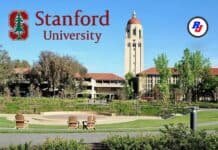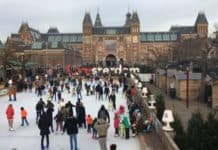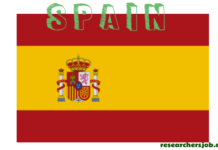HFSP Postdoctoral Fellowship 2023 for Early Career Scientists
Designation/Position- HFSP Postdoctoral Fellowship
Human Frontier Science Program (HFSP) invites applications for HFSP Postdoctoral Fellowship from eligible and interested candidates
About- The HFSP fellowship program supports proposals for frontier, potentially transformative research in the life sciences. Applications for high-risk projects are particularly encouraged. The projects should be interdisciplinary and challenge existing paradigms by using novel approaches and techniques. Scientifically, they should address an important problem or a barrier to progress in the field. Long-Term and Cross-Disciplinary Fellowships
The Program aims to complement, not duplicate, the frontier life science programs of the countries that provide HFSPO financial support.
HFSPO attaches the highest importance to novelty, scientific merit, internationality, and interdisciplinarity.
Research/Job Area- Biological topic and non-biological discipline (e.g., physics, chemistry, mathematics, engineering or computer sciences)
Location- HUMAN FRONTIER SCIENCE PROGRAM (HFSP)
Skype Interview Tips and Tricks – Best Practices in the Video interview
Eligibility/Qualification–
Please refer to the application guidelines for complete eligibility information.
Important eligibility criteria:
1) Nationality
A candidate not a national from one of the HFSP members (see list below) may apply to work only in a research institution in one of the member countries. A national candidate of one of the member countries can apply to work in a research institution in any country.
HFSP member countries: Australia, Austria, Belgium, Bulgaria, Canada, Croatia, Cyprus (EU part only), Czech Republic, Denmark, Estonia, Finland, France, Germany, Greece, Hungary, India, Republic of Ireland, Israel, Italy, Japan, Republic of Korea, Latvia, Lithuania, Luxembourg, Malta, The Netherlands, New Zealand, Norway, Poland, Portugal, Romania, Singapore, Slovakia, Slovenia, South Africa, Spain, Sweden, Switzerland, the United Kingdom and the United States of America.
Applicants must propose to work in a country different from where they did their previous Ph.D. work or first post-doctoral studies. For institutions not classified as national, i.e., international or extraterritorial institutions such as EMBL, ICPT or ICGEB, the country where the laboratory is located will be considered the host country.
2) Doctoral degree
A research doctorate (Ph.D.) or a doctoral-level degree comparable to a Ph.D. with equivalent experience in basic research (e.g., a research-based MD or medical Ph.D.) must be conferred by the start of the fellowship. It is not required at the time of submission. By “conferred degree,” we mean you have received your diploma for the degree. The “conferral date” is the date on the official Ph.D. document. Please refer to the application guidelines for information in case you were not yet awarded the Ph.D.
3) Research publications
Applicants must have at least one lead author publication by the submission deadline of the Letter of Intent which can be a manuscript (1) published in a recognized OA preprint repository, or (2) accepted for publication, (3) in press or (4) already published by a peer reviewed journal.
Submission of a fellowship application at the Full Proposal stage however is only possible with a published research article according to points (2) to (4) above. HFSP only accepts full-length original research publications in English that were peer reviewed and for which the applicant must either be the single author, first author or joint first author. In a joint first author paper the applicant does not need to be listed in the first position, but the equal contribution of the authors must be clearly stated in all cases.
In some cases the standard publication practice makes first authorship impossible (e.g. alphabetical listing of authors); these circumstances must be explained in the the application.
Job/Position Description-
The HFSP fellowships are for 3 years, with no possibility for renewal. 2024 fellows may interrupt HFSP support after the first year, for up to one year, while continuing their postdoctoral research funded through other sources (deferral period).
Fellows are granted a living allowance as well as a research and travel allowance. Depending on their specific situation fellows may also qualify to receive a child allowance, a parental leave allowance and a relocation allowance.
Allowances differ depending on the host country. The complete overview of HFSP fellowship allowances are stated in the 2024 application guidelines.
HFSP fellows cannot concurrently hold an HFSP Fellowship and another paid employment position (i.e., a position supported by a salary) or another paid fellowship from another organization. However, the HFSP Fellowship can be supplemented from other sources (e.g., from a host supervisor’s grant or from institutional funds). HFSP fellows may apply for and hold additional research grants themselves, provided those funds will not be used as a salary for the fellows and are to assist their conduct of the Fellowship research project as presented in the fellow’s successful application. HFSP fellows must devote themselves entirely to their research project in the host institution and may not engage in any other paid activity without prior agreement of HFSPO.
The PhD must have been conferred when the fellowship is activated.
HFSP fellows can either use the third fellowship year to continue to work in the host laboratory, to return to their or their spouse’s/partner’s home country, or to move to another HFSP member country.
HFSP postdoctoral fellowships encourage early career scientists to broaden their research skills by moving into new areas of study while working in a new country.
Two different fellowships are available:
Long-Term Fellowships (LTF) are for applicants with a PhD on a biological topic who want to embark on a novel and frontier project focussing on the life sciences.
Cross-Disciplinary Fellowships (CDF) are for applicants who hold a doctoral degree from a non-biological discipline (e.g. physics, chemistry, mathematics, engineering or computer sciences) and who have not worked in the life sciences before.
There is only one competition per year for HFSP Fellowships. Applications for the 2024 HFSP Long-Term and Cross-Disciplinary Fellowships (to start in 2024) will follow a two-step submission process via the online submission platform ProposalCentral. Firstly, applicants will be asked to submit a Letter of Intent from which the review committee will select the best proposals. In a second step, successful applicants will be invited to submit a Full Proposal.
How to Apply-
The link to the registration portal of each program is available in the corresponding application guidelines.
The application guidelines for the 2024 HFSP
– Long-Term Fellowships can be downloaded here,
– Cross-Disciplinary Fellowships can be downloaded here.
The HFSP application portal in ProposalCentral opened on March 15, 2023 for Letters of Intent.
For questions about registration in ProposalCentral please use the following contact:
https://proposalcentral.com/inforequest.asp
E-mail: Click here to show mail address
Last Date for Apply– 11 May 2023
- Submission of a Letter of Intent by 1 PM (Eastern Time US) by May 11, 2023
- The fellowship applicant will be notified between mid-August and end of August whether his/her Letter of Intent was selected for submitting a Full Proposal.
- Submission of Full Proposals for invited applicants by 1 PM (Eastern Time US) by September 28, 2023 via ProposalCentral.
How to write an attractive research proposal?
How to Write an Effective Cover Letter – Prepare Yourself
6 golden tips for finding successful postdoctoral opportunities
DST Postdoctoral Fellowships by DST, Government of India
Some Effective Tool to Improve Your Research Writing Skill








